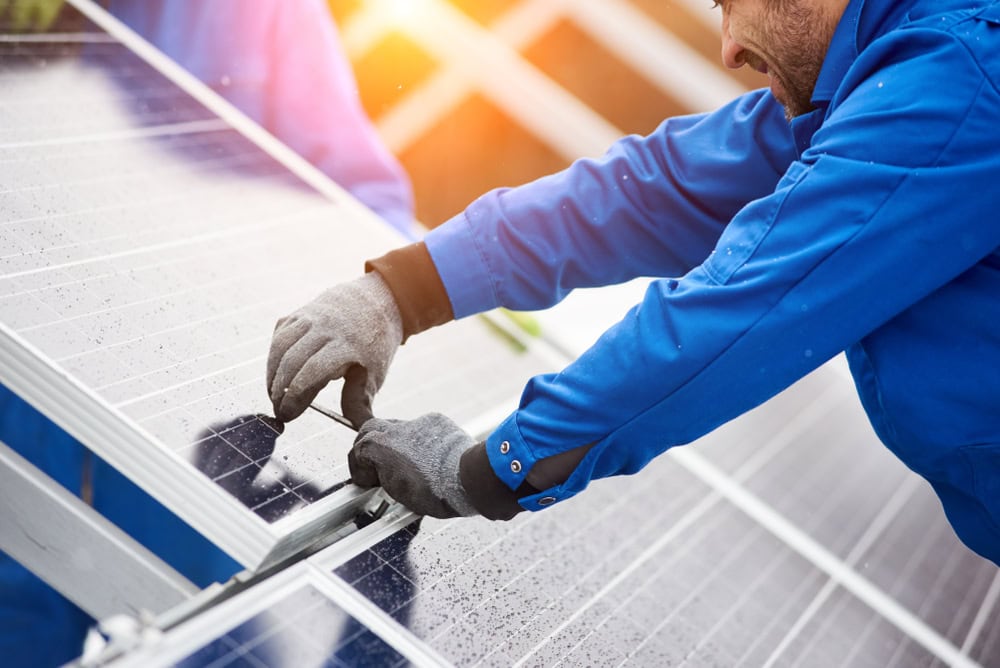When it comes to sunshine year-round, you can’t get much closer than California’s perpetually summerish weather. And with sunshine comes opportunity – solar panels are in growing demand throughout the state, with government subsidies and incentives improving the attractiveness of solar panels to homeowners.
Thankfully, there are thousands of licensed contractors qualified to install photovoltaic solar energy systems under California Contractors State Licensing Board standards. The CSLB is notorious for strict, well-defined guidelines on who can work on what type of job in the state as a construction contractor – and crossing the CSLB is a big no-no for construction workers in the state.
With that in mind, who can work on solar panel jobs in California? In this article, we’ll cover the basics of solar panel installation – including exactly who can install solar panels in the state, as per the CSLB.
License Classifications for Solar Work
General Engineering and Building Contractors
- “A” – General Engineering Contractors: Engineers holding Class A General Engineering contractors licenses in the state are fully authorized to install solar energy systems, from start to finish. Class A contractor’s licenses are stunningly broad – check out our article on Class A contractors for more info.
- “B” – General Building Contractors: The big kahuna Class B General Contractors license does cover solar energy systems installations – but only as part of a broader construction project involving two or more unrelated building trades.
- For example, a general contractor can do solar panel installations if they are also performing plumbing and electrical work. But if they’re only doing electrical work or plumbing work, they would not be allowed to do solar panel installs. Make sense? Not really, but that’s the rules!
Specialized Solar and Related Contractors
- C-4 – Boiler, Hot-Water Heating, and Steam Fitting Contractors: These Class C specialty contractors usually work on compressed water systems, but they are absolutely authorized to work on solar heating equipment as part of systems related to their classification.
- C-10 – Electrical Contractors: As you might expect, sparkies can do work on solar panels, but only when solar projects involve energy generation, transmission, or utilization. This is pretty much every solar panel installation, as well, the whole point of solar panels is energy generation.
- C-36 – Plumbing Contractors: Like C-4 contractors, C-36 plumbing contractors are authorized to install solar equipment when it is involved with heating water or fluids.
- C-46 – Solar Contractors: Obviously, C-46 solar contractors are allowed to work on any and every solar-related job. C-46 contractors specialize in installing, modifying, maintaining, and repairing thermal and photovoltaic solar energy systems, so yeah, they can do it.
- C-53 – Swimming Pool Contractors: Oddly enough, swimming pool contractors have some ability to install solar panels, but only when it involves the simple installation of solar heating in swimming pool projects.
Solar Energy System Disclosure Document
Before finalizing the purchase, finance, or lease of a residential solar energy system, contractors must provide a “Solar Energy System Disclosure Document.”
This is not optional – this is stipulated by the CSLB. This document ensures total transparency between all parties and includes:
- Total system cost, including financing and energy/power costs, if applicable.
- Information on filing a complaint with CSLB.
- Details about the right to cancel the contract, with a 3-business day window for most consumers and a 5-business day window for those 65 or older.
As a secondary note, the final disclosure must be provided in the same language used in the sales presentation or marketing materials.
Additional Resources for Solar Consumers
The CSLB provides links to various resources to help consumers make informed decisions about solar investments on their website.
Here’s their list of resources that can help you as a contractor understand what your potential customers are looking for, and how you can meet them where they are.
- California Solar Consumer Protection Guide
- Fresno County Consumer Solar Bulletin
- Department of Energy Solar Energy Basics
- Solar Electricity Basics
- Department of Energy’s Guide to Solar Lingo
- FTC’s Solar Power for Your Home Guide
- National Utility Rate Database
- Guide to Financing Options
- California Hub for Energy Efficiency Financing (CHEEF)

